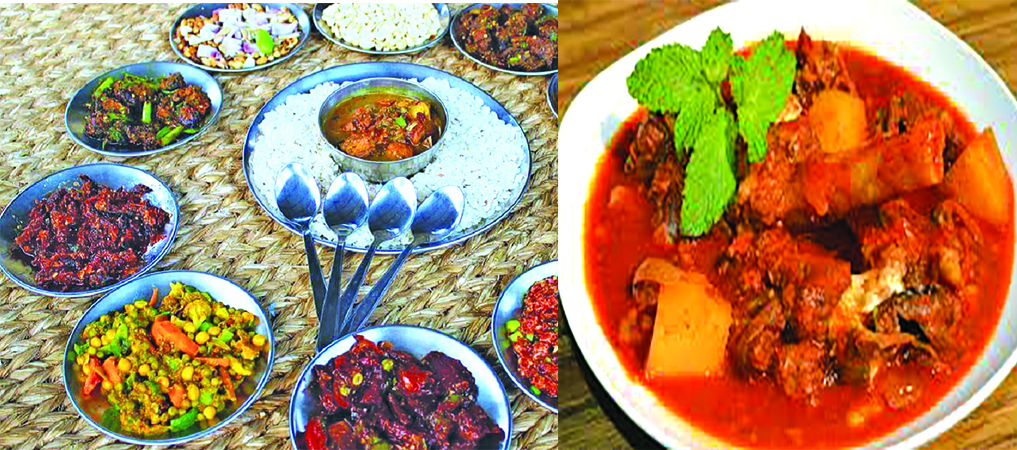Food, Festive Mood And Pandemic

Monica Pradhan
Food is the essence of life. While food is imperative for survival, their prominences during festivals are central to the happiness, excitement and lasting memories. This year’s festivals however, have been different in many ways.
While the Nepalis around the world have just winded up Dashain, an important Hindu festival, and preparing to usher in upcoming festivals, we all cannot deny the fact that the ongoing COVID-19 pandemic has affected our festive fervour.
Be it the stark change in the manner of celebration or the confinement of us within homes limited to immediate family members, an aura of uncertainty has prevailed. Within the low-key celebrations, a big reason for keeping our spirits high and moods uplifted is definitely the special meals cooked for Dashain and Tihar.
Relishing Delicacies
One unique aspect of Nepal is the diversity and variation in caste and ethnicity along with their rich culture and traditions within a small geographical area. This diversity is profoundly reflected in Nepal's food culture. Be it the hills, mountains or Terai region, a wide array of unique, exotic and mouth-watering delicacies have come down from generations among all communities.
Despite the ordeals and challenges in one’s life, major festivals have always been associated with blessings, good food and better hopes. While the ongoing global pandemic has dampened our spirit, the psychological function of food was never so prominent before. With uncertainty of pandemic still looming around, festive food has definitely played a central role to keep the bonds stronger and uplift our moods.
For most communities in Nepal, good food in Dashain relates to the privilege of relishing a variety of meat delicacies that are cooked in unique styles. Delicacies to look forward to during these times include Pakku- a goat meat delicacy, Sekuwa- roasted meat, Bhuttan- an assorted preparation from offals, Phokso fry- from goat lung, Taa-kha and Sanya-khhuna- spicy meat gel, Alu tama- curry made from fermented tender Bamboo shoots and many more.
Similarly, sweet and sour pickles made from Lapsi, a Nepalese Hog Plum, Khalpi, a fermented cucumber pickle and Pau, a sour drink prepared from Lapsi are some of the festive cravings. Vegetarian festive meal commonly includes wide varieties of milk products, sweets Kheer, Puri, Halwa, Selroti etc. Some ethnic communities include fermented cereal beverages as integral part of such cultural fiesta. Most traditional Nepalese meals are made from locally available ingredients and reflect a striking balance of nutrition and digestibility.
This pandemic has added many new dimensions to our life. These trying times have made us realise that dependence on readymade food could be reduced with simple homemade food. The long lockdown periods compelled us to reflect on our lives, value relations more than ever and prioritize health. It gave us opportunities to uncover and cultivate our hidden passions like cooking, gardening, housekeeping etc.
An unprecedented use of social media for connecting to families, sharing lockdown experiences, receiving and giving online blessings or even posting tempting pictures of delicacies are just a few to mention.
People are slowly adapting to the new normal and increasingly becoming more conscious of their social responsibility. This was also evident in the almost empty temple premises in Dashain, which otherwise would be bustling with festive zeal. In a country where religious and cultural beliefs are the essence of our identity, religious devotees resorted to celebrating rituals within homes.
Enjoying food with family members helped relieve stress to some extent. Upcoming festivals like Tihar, Chhath, Losar and Christmas have to be celebrated in an equally safe and responsible manner. Care needs to be taken to prevent the risk of acquiring and spreading infections. A bit of an effort from all family members in putting together hearty meals, would go a long way to keep up the festive spirits.
Food is an integral aspect of any festival regardless of religion or culture signifying an expression of gratitude and love. While we are still fighting the unknown forces of coronavirus, it is important to prioritize our daily activities and comply with heath guidelines to fight the contagion.
Solace In Home-cooked Food
Finding pleasure and solace in home cooked traditional meals using resources at our disposal is the need of the hour. Celebrations are always there for next year but life cannot be risked. This is a nature’s call to learn to adapt to the changing circumstances and be more mindful of our health.
Even amidst the pandemic, as festivals approach, our hearts still will yearn for the traditional delicacies. This in itself highlights the significance of the psychological role of food entwined with cultural values. Apart from its basic physiological function of nourishing the body and strengthening immunity, the role of food in spreading happiness will definitely go a long way in building our resilience to negativity.
(The author is a food technologist)
Recent News

Do not make expressions casting dout on election: EC
14 Apr, 2022
CM Bhatta says may New Year 2079 BS inspire positive thinking
14 Apr, 2022
Three new cases, 44 recoveries in 24 hours
14 Apr, 2022
689 climbers of 84 teams so far acquire permits for climbing various peaks this spring season
14 Apr, 2022
How the rising cost of living crisis is impacting Nepal
14 Apr, 2022
US military confirms an interstellar meteor collided with Earth
14 Apr, 2022
Valneva Covid vaccine approved for use in UK
14 Apr, 2022
Chair Prachanda highlights need of unity among Maoist, Communist forces
14 Apr, 2022
Ranbir Kapoor and Alia Bhatt: Bollywood toasts star couple on wedding
14 Apr, 2022
President Bhandari confers decorations (Photo Feature)
14 Apr, 2022










